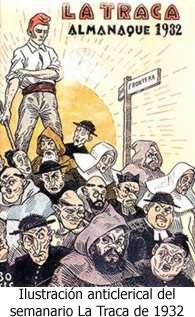
I finished my Camino on October 31, met my wife, and we stayed in Santiago until November 4, just before the arrival of the Pope. We went to Madrid for a few days and observed, among other things, the controversy started by the remarks that Benedict made to reporters on his plane:
“In Spain, a strong, aggressive laicity, an anti-clericalism, a secularization has been born as we experienced in the 1930’s,” Benedict said.
Along the Camino I had seen the memorials to the priests and religious murdered by the Republican side in 1936-1939 – and also the memorials to the leftists murdered by the Nationalist forces. With the wayside crosses, such memorials put the aches and pains I was feeling into a proper perspective.
At the Prado we saw Goya’s overwhelming paintings of the violence and repression in Madrid during the battle between the Spanish people and the French forces in 1808. At the Queen Sofia museum we saw an exhibition about the Spanish Civil War – of which Picasso’s “Guernica” was the centerpiece. The Republican propaganda showed the Catholic clergy as murderous allies of the Nazi-dominated fascists. We saw the newsreels of the battle of Madrid, newsreels of the children killed by bombs and artillery.
On Saturday we attended mass at the Augustinian church – the mass of the martyrs of the order, murdered in Spain 1936-1939. We were given cards with their pictures, and the relics were in the church. The priest pointed to the martyrs during his sermon, as he spoke too of the Catholics murdered during the All Saints day mass in Iraq.
Those who know Spain far better than I do say that conditions have changed so much that another civil war is impossible – I hope they are right. But the memories of the war are bitter on both the Catholic and laicist sides.
Franco was ruthless in his conduct of the war as a matter of policy and was not magnanimous in victory. The Republican side let mobs massacre soldiers and clergy and suppressed all Catholic activity. It was hardly surprising that Catholics turned to Franco to save them from being slaughtered, but they turned a blind eye to Franco’s slaughter of Republicans who had done nothing criminal.
Are the Pope’s comments justified? I do not know enough about Spanish life to know whether the consumerist secularism of today’s Spain is as dangerous as the murderous “Laicismo” of the 1930s. Catholics and laicists have learned to live together in Spain, but they still do not like or respect each other.
Welcome back.
Yes. Bienvenido! I hope you had a time of real rest and spiritual renewal.
I second Caroline’s and Fr. Koening’s sentiments!
I think the problem with “laicismo” is the fact that, for far too long, the Catholic Church took the side of rulers in ostensibly Catholic countries, way before Franco. Consequently, rebelling against a church that sided with the ruling classes would be natural when the laity’s legitimate grievances were not addressed.
This is not solely a Catholic problem; Luther demanded that the German nobles put down the “Peasant’s Revolt” mercilessly. This also isn’t an ancient problem; the 1929 Concordat between Italy and the Vatican turned Roman Catholicism into Italy’s state religion…unable or unwilling to confront Mussolini.
The fundamental problem is the European model of church “establishment,” whether Catholic, Protestant or Orthodox. Leaders of an “established” church realize that they depend on patronage and support from the ruling classes and the institutions that support those classes. Consequently, they sell out to those institutions and classes and ignore the Gospel.
That’s the reason why American Christianity is more vibrant than European Christianity. We in the United States have never had one “established” denomination that received state support and patronage. Indeed, such an arrangement is unconstitutional. Therefore, American churches could operate freely without fear of government interference.
Unfortunately, the Catholic Church has not changed. The institution of a separate clerical class with monarchistic pretensions and an accompanying sense of entitlement mitigates against any sense of transparency and accountability. Until that situation changes, nothing will change.
The reason that American Christianity is more vibrant does lie in it’s wealth of views and the freedom to disparage each other freely for our faulty actions and the righteous acts we fail to do.
We are forced out of the sand to speak and question, in our hearts at the very least, in a way that Christians of no other country really have had to, throughout their cultural development.
Here nationalism is not tied up with religion. The closest we’ve ever been to that is the motto “In God We Trust”, rather than “For God and Country”
At best we ask of god, not speak for god. Even the crass and ignorant among us hesitate to say they know the mind of god.
And the few who step over that line seem to go down in flames shortly after.
The Pope’s comments are justified!